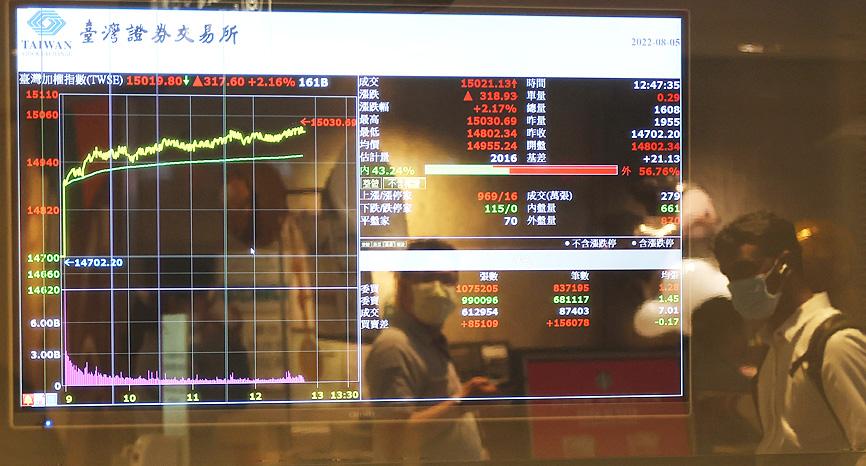The combined pretax profit of Taiwan Stock Exchange (TWSE)-listed firms grew 24.55 percent year-on-year to NT$2.31 trillion (US$77.02 billion) in the first half of this year, with the semiconductor, shipping and electronic components sectors contributing the most, the exchange said yesterday.
In the first six months of the year, the 853 listed companies — excluding 34 financial firms and two companies that did not submit second-quarter financial reports, Chung Fu Tex-International Co (中福) and Roo Hsing Co (如興) — reported combined revenue of NT$18.14 trillion, up 14.21 percent from a year earlier, the TWSE said.
The combined revenue of semiconductor companies expanded 27.2 percent to NT$2.41 trillion due to increased demand for 5G products, high-performance computing devices and automotive chips, it said.

Photo: CNA
Large-cap companies such as Taiwan Semiconductor Manufacturing Co (台積電), MediaTek Inc (聯發科) and ASE Technology Holding Co (日月光投控) topped the list in terms of revenue, the exchange said, adding that small-cap firms also posted bigger increases in first-half revenue.
IC designer Faraday Technology Corp’s (智原) revenue in the first six months grew 103 percent to NT$6.57 billion and Winway Technology Co (穎崴科技), which provides semiconductor testing interfaces, reported that revenue rose 56 percent to NT$1.85 billion from a year earlier, the TWSE said.
Companies in the transportation sector, such as cargo shippers, airlines, logistics firms and forwarding companies, reported a rise on combined revenue of 60 percent to NT$952 billion in the first half on the back of high freight rates, it said.
The combined revenue of makers of electronic components grew 12 percent to NT$941 billion, led by Hotron Precision Electronic Industrial Co (鴻碩) and Cheer Time Enterprise Co (晟鈦), it said.

Real estate agent and property developer JSL Construction & Development Co (愛山林) led the average compensation rankings among companies listed on the Taiwan Stock Exchange (TWSE) last year, while contract chipmaker Taiwan Semiconductor Manufacturing Co (TSMC, 台積電) finished 14th. JSL Construction paid its employees total average compensation of NT$4.78 million (US$159,701), down 13.5 percent from a year earlier, but still ahead of the most profitable listed tech giants, including TSMC, TWSE data showed. Last year, the average compensation (which includes salary, overtime, bonuses and allowances) paid by TSMC rose 21.6 percent to reach about NT$3.33 million, lifting its ranking by 10 notches

SEASONAL WEAKNESS: The combined revenue of the top 10 foundries fell 5.4%, but rush orders and China’s subsidies partially offset slowing demand Taiwan Semiconductor Manufacturing Co (TSMC, 台積電) further solidified its dominance in the global wafer foundry business in the first quarter of this year, remaining far ahead of its closest rival, Samsung Electronics Co, TrendForce Corp (集邦科技) said yesterday. TSMC posted US$25.52 billion in sales in the January-to-March period, down 5 percent from the previous quarter, but its market share rose from 67.1 percent the previous quarter to 67.6 percent, TrendForce said in a report. While smartphone-related wafer shipments declined in the first quarter due to seasonal factors, solid demand for artificial intelligence (AI) and high-performance computing (HPC) devices and urgent TV-related orders

Prices of gasoline and diesel products at domestic fuel stations are this week to rise NT$0.2 and NT$0.3 per liter respectively, after international crude oil prices increased last week, CPC Corp, Taiwan (台灣中油) and Formosa Petrochemical Corp (台塑石化) said yesterday. International crude oil prices last week snapped a two-week losing streak as the geopolitical situation between Russia and Ukraine turned increasingly tense, CPC said in a statement. News that some oil production facilities in Alberta, Canada, were shut down due to wildfires and that US-Iran nuclear talks made no progress also helped push oil prices to a significant weekly gain, Formosa said

MINERAL DIPLOMACY: The Chinese commerce ministry said it approved applications for the export of rare earths in a move that could help ease US-China trade tensions Chinese Vice Premier He Lifeng (何立峰) is today to meet a US delegation for talks in the UK, Beijing announced on Saturday amid a fragile truce in the trade dispute between the two powers. He is to visit the UK from yesterday to Friday at the invitation of the British government, the Chinese Ministry of Foreign Affairs said in a statement. He and US representatives are to cochair the first meeting of the US-China economic and trade consultation mechanism, it said. US President Donald Trump on Friday announced that a new round of trade talks with China would start in London beginning today,